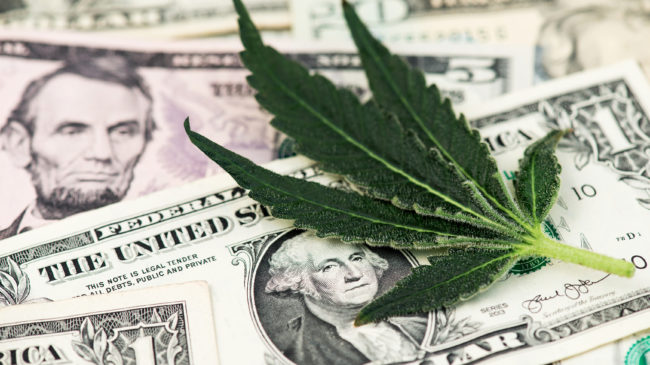Last week, the House passed another round of federal stimulus spending as it aims to provide relief for economic damages caused by the coronavirus pandemic and the related shutdowns enforced by state and local governments. The measure, which the Senate and President Donald Trump say they do not intend to pass or sign, would spend another $3 trillion, including money for state governments that could be used in a variety of ways, including bailing out state pension systems for public employees, which have been routinely mismanaged and underfunded for decades.
A potential bright spot in the Health and Economic Recovery Omnibus Emergency Solutions (HEROES) Act might be its somewhat unexpected inclusion of the previously-proposed SAFE Banking Act. The SAFE Banking Act, short for Secure and Fair Enforcement Banking Act, has been proposed in the past by Rep. Ed Perlmutter (D-CO) as a potential solution for allowing state-legal marijuana businesses to access financial services.
Since those legal cannabis businesses have been systematically excluded from banking services in the past, they are forced to conduct business transactions primarily in cash, which creates problems for both public safety and compliance. Stories abound about legal marijuana businesses and their employees being targeted for violent robberies because it is known these entities house large amounts of cash. Even state and local governments have worried about receiving excise taxes from these companies in cash and the federal Internal Revenue Service has complained that it can’t handle cash payments for corporate income taxes from these companies.
On the compliance side, a lack of bank records makes it harder for tax authorities and regulators to review a licensed marijuana company’s transactions to ensure all tax duties have been paid and those companies have not illegally sold marijuana to unlicensed or underage entities. In one of the great ironies of precluding legal marijuana businesses from accessing financial services, cash-intensive businesses are simply more difficult to audit because the transactions are easier to conceal.
The SAFE Banking Act originally aimed to ease these concerns by making it easier for traditional banks to offer accounts to state-legal marijuana businesses. However, while it would ease a portion of the obstacles currently in place, it would not allay the additional compliance costs facing banks that would offer accounts to these marijuana businesses, which is the most significant issue.
As I detailed in a recent Reason Foundation policy brief on the topic, financial institutions that might otherwise wish to offer accounts to marijuana businesses currently face three major obstacles and a few smaller ones. First, newly-chartered financial institutions are required to procure deposit insurance. Banks acquire such insurance from the Federal Deposit Insurance Corporation while credit unions in most states are required to seek deposit insurance from the National Credit Union Association. These institutions have both refused to provide deposit insurance to banks that offer accounts to marijuana businesses.
Second, financial institutions must acquire a master account from the Federal Reserve in order to process any interbank transactions. This would include wires, checks and other forms of payments between account holders at different banks. Without a Fed master account, a financial institution would be reduced to a glorified vault wherein account holders could deposit money, but could not use the account to transact with customers or vendors. The Federal Reserve has refused these accounts to new financial institutions that propose to offer accounts to marijuana businesses.
The SAFE Banking Act prohibits federal banking regulators from discriminating against banks that offer accounts to marijuana businesses. That prohibition may solve the first of these two issues, but does little to address the Federal Reserve’s objections since it is technically a private entity.
It’s unclear how the SAFE Banking Act would affect the most significant obstacle for existing financial institutions to offer accounts to marijuana businesses—the costly reporting that banks and credit unions must conduct and provide to the federal Justice Department regarding marijuana-related transactions. The Justice Department’s Financial Crimes Enforcement Network (FinCEN) has effectively conscripted financial institutions into the policing of federally illicit activity by requiring detailed reports on any suspicious activity, including specific reports for marijuana-related transactions. All financial institutions chartered in the United States are required to make regular reports to FinCEN on accounts held by marijuana-related businesses, including over individual transactions within those accounts. Some banks and regulators have interpreted this to include businesses that never even touch marijuana, but offer accounting, legal or other services to businesses that do or that publish magazines that talk about marijuana.
These requirements simply make it more costly for most banks or credit unions to service a marijuana-related account than they could hope to earn off that account. As a result, most financial institutions just choose not to offer those accounts. The SAFE Banking Act requires FinCEN to develop new reporting guidelines, but does not specify what those guidelines should be.
More broadly, the SAFE Banking Act would do nothing to allow marijuana businesses to gain access to financial services other than basic checking accounts. Small-business loans, inventory loans, and similar financing mechanisms would remain impermissible, forcing marijuana businesses to rely on private capital markets— perhaps one of the industry’s biggest barriers to entry.
In short, the SAFE Banking Act is better than the current system but, unfortunately, is not the panacea hoped for by most marijuana businesses. It was nice to see the law appear in the HEROES Act. Since that bill seems unlikely to pass the Senate and be signed into law, Congress has the opportunity to improve on it if another stimulus and relief bill is written.

